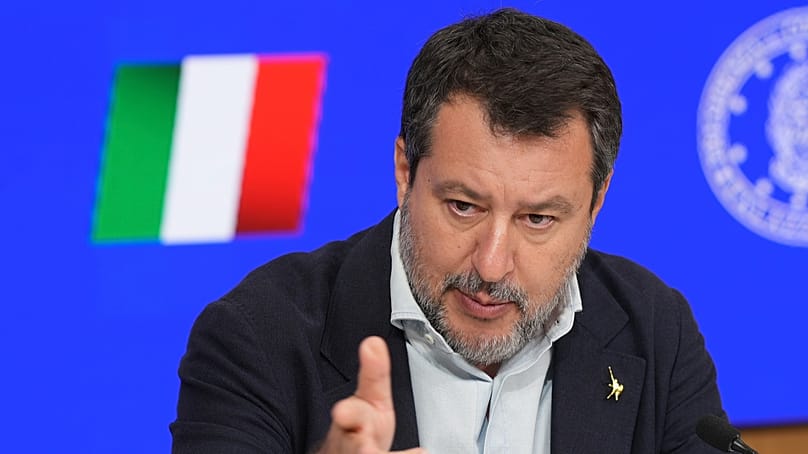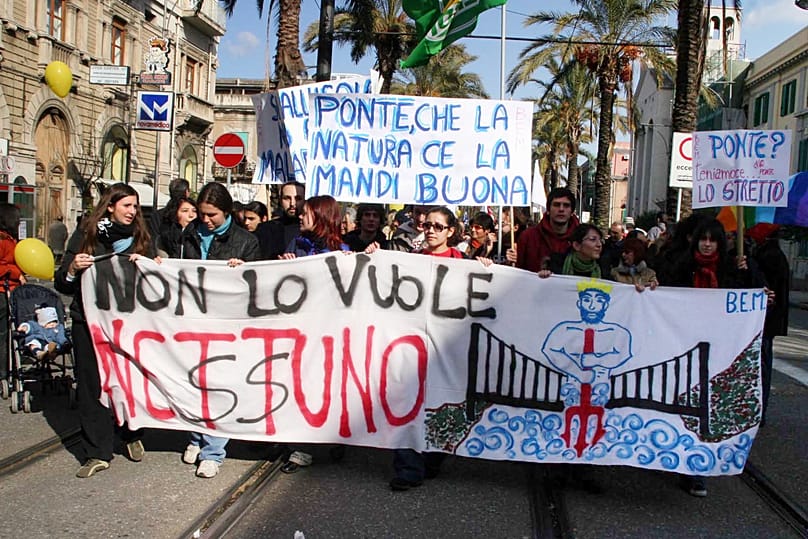Italy's top audit court recently rejected the government's long-standing plan to build what would be the world's longest suspension bridge connecting the island of Sicily to the region of Calabria across the Strait of Messina.
The Italian Court of Auditors — which oversees public spending — said it would release the full reasoning behind its rejection within 30 days.
During a hearing on 29 October, the judges questioned whether the 2005 tender for the project still held, citing a mismatch in projected costs and whether it complied with EU competition rules.
The project has also been slammed by critics as being too costly and for its potential environmental impact and risks linked to seismic activity in the region.
The country's Deputy Prime Minister and Transport Minister Matteo Salvini, who has spearheaded the €13.5 billion project and tipped it as "the most important public work in the world", has vowed to push ahead with the plan.
If built, the 3.7-kilometre suspension bridge would transform transport links for Sicily's approximately 4.7 million inhabitants, connecting them to the mainland for the first time.
Salvini, who once campaigned for Italy's north to break away from the rest of the country, has billed the project as a way to give Italy’s southern regions an economic boost.
After the court delivered its conclusions, Salvini slammed the decision as "a political choice rather than a serene technical judgement".
Likewise, Italian Prime Minister Giorgia Meloni said the court's verdict was "yet another invasion of jurisdiction over the choices of the Government and the Parliament," despite the court having a more regulatory function.
Their comments come amidst tensions between the Italian government and the judiciary, which has fiercely resisted Meloni's sweeping judicial reform proposals and challenged her flagship initiative to process migrants arriving in Italy in Albania.

The pair later toned down their comments after holding a meeting to discuss the court's refusal, with Salvini telling reporters that the government "awaits the court's remarks with complete calm and is confident we can answer them point by point, because we have complied with all regulations."
Construction of the project, he said, would start in February rather than November, and the government would, "without any clash between state powers… provide all the information requested".
But can Salvini and Meloni bypass the Court of Auditors?
What is Italy's Court of Auditors?
Italy's Court of Auditors, which dates back to 1862, is a constitutional body responsible for supervising public functions. Its core duty is auditing government spending, reviewing the financial impact of laws and guaranteeing public spending is in line with both national and EU budget rules.
The court can deliver preventative overviews, such as the case with the proposed bridge, as well as judicial oversight. The latter means it can issue rulings on accounting irregularities and the potential misuse of public money on already completed projects.
Can the Italian government ignore its decision?
In short, yes, but not without some risk. Experts say, however, that overall, the government could press ahead and potentially be free from the consequences of the project failing.
According to Nicola Lupo, professor of constitutional law at LUISS Guido Carli University in Rome, if the government does push ahead with the plan without satisfying the court's misgivings, the court can register its reservations.
"In this case, the Court of Auditors has to make a so-called registration of reservation, which is transmitted to parliament," Lupo told The Cube, Euronews' fact-checking team. "In theory, it raises the political responsibility of the government to act."
If the bridge, which faces fierce opposition from critics, including those in Italy's south, faces legal opposition down the line, the courts' warning over its viability could serve as a premise for future lawsuits.

Both Meloni and Salvini have said they will respond to the court's reservations about the bridge. Even if the court is not satisfied, they can still press ahead with the project.
"The Court of Auditors acts as an auxiliary body, as a control body of the government," Lupo explained. "It does not have the last word, let's say."
Leila Simona Talani, professor of international political economy at King's College London, told The Cube that the government will most likely respond by reiterating its desire to start the project on the basis of the national interest.
"There is a clause that if they do not finish the work, if they don't have the money, or there are some obstacles, there is a system of compensation already embedded in the project if it may fail," she said. "So, the whole project is being packaged in a way that even if it fails, nothing will happen in practice, unless there is significant corruption."
The primary impact of the court's hesitation is that the Italian government "will have to reunite again and establish that this is of the utmost public interest for the country", she said.
"Unless [Meloni] is in government for 20 years, it's highly unlikely she will be responsible for finishing the end of this project," Talani added, pointing to other public infrastructure projects in Italy, such as the construction of the Salerno-Reggio Calabria highway, which took 55 years to complete.
"I don't really think accountability is a question here; there is little question of accountability for the government," she said.







